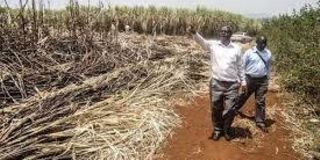Bobi Wine is misguided on Sugarcane growing in Busoga

What you need to know:
Sugarcane growing was a problem as a sole or major agricultural activity in the past but government has been systematically redirecting economic activities in the sub-region while streamlining the sugar industry at the same time
Recently, while on his campaign trail, presidential candidate Robert Kyagulanyi, alias, Bobi Wine said the problem of Busoga is sugarcane growing.
This allegation has been raised by many and no longer holds sway when it comes to weighing Busoga’s options and standing on the national economic scale.
Sugarcane growing was a problem as a sole or major agricultural activity in the past but government has been systematically redirecting economic activities in the sub-region while streamlining the sugar industry at the same time
Sugar business is not bad economics when there is a calculation; small holder farmers cannot earn much when they plant their meagre land with sugarcane.
It is large scale farmers (companies) that benefit due to the economically viable acreage and systems they have in place to manage the crop and all the processes involved in turning it into the high value commodity (sugar) that make real money.
These ones must be encouraged and protected while the small holder farmers have been attended to in other ways including being supported to engage in alternative ventures-not limited to agriculture.
The turnaround in the sector may not happen in just a day but the economics of sugarcane growing is understood by every Musoga. It is no longer a cause for alarm.
For farmers still interested in the sugarcane business, a special buffer fund to cushion them as they wait for their crop to reach full maturity is underway.
Prices of fertilizers are being suppressed for affordability. They also need to advance their farming with more tractors for tilling land, ferrying cane and other utilities on a shamba. Research conducted for government revealed that 60 per cent of the farmers were making losses during harvest when they depended on unreliable private transporters who at times did not turn up to ferry the crop leaving it to wither in the gardens.
It was also realised that farmers needed a strong lobby to bargain for better prices in the market. The relationship with big millers depended on how strongly leaders backed the farmers. Smallholder farmers can get good prices for their produce, on top of being organised towards a goal of establishing their own mills. This is where the idea of zoning came (whereby producers or millers in a given territory are accorded space autonomy of a radius of 25kilometers exclusive to them free from competition). So, really, sugar business is sweet for Busoga if all the transformatory ideas surrounding it are implemented and that is an ongoing process.
Other areas have developed rapidly on account of sugarcane growing, processing and marketing; how can Busoga be an exception?
Even Acholi are excited because of the coming of Atiak sugar. The problem is not sugarcane growing; there are other factors affecting Busoga’s faster development.
Busoga has a number of influential figures serving in government. But these prominent sons and daughters have not been well used as a conduit for development. Instead, they are victims of endless, baseless and headless intrigue and the infamous pull him/her down syndrome.
Busoga cannot develop, neither has it failed to develop, by relying on sugarcane alone. Looking at sugarcane as the only line of survival is as misguided as attributing Busoga’s problems to the crop. It is a narrow perspective!
Faruk Kirunda,




